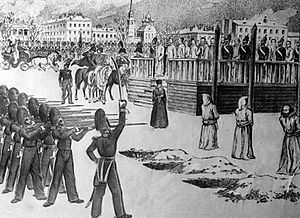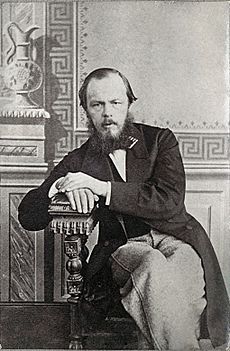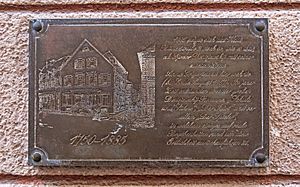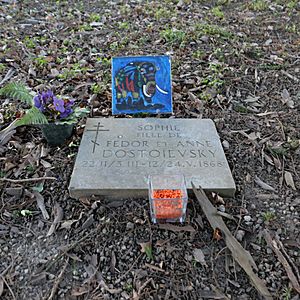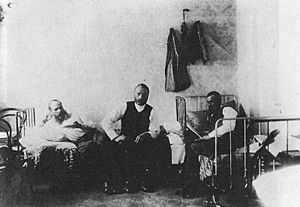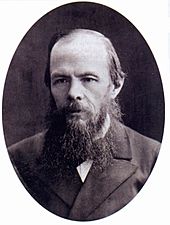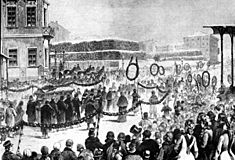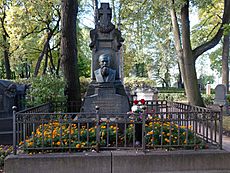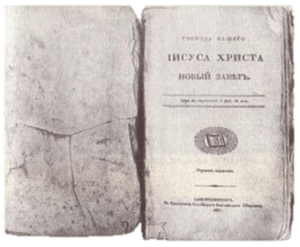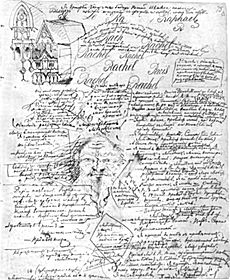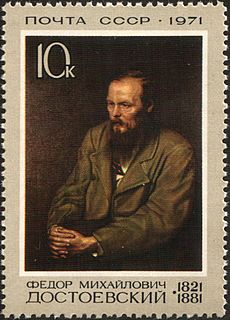Fyodor Dostoevsky facts for kids
Quick facts for kids
Fyodor Dostoevsky
|
|
|---|---|
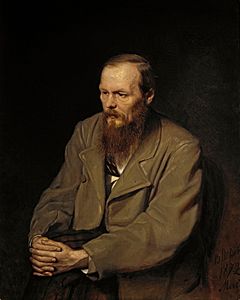
Portrait of Fyodor Dostoyevsky by Vasily Perov c. 1872
|
|
| Born | Fyodor Mikhailovich Dostoevsky 11 November 1821 Moscow, Moskovsky Uyezd, Moscow Governorate, Russian Empire |
| Died | 9 February 1881 (aged 59) Saint Petersburg, Saint Petersburg Governorate, Russian Empire |
| Occupation |
|
| Education | Military Engineering-Technical University |
| Genre |
|
| Literary movement | Realism, Philosophy, Personality psychology |
| Years active | 1844–1880 |
| Notable works |
|
| Spouse |
Maria Dmitriyevna Isaeva
(m. 1857; died 1864)Anna Grigoryevna Snitkina
(m. 1867) |
| Children | 4, including Lyubov Dostoevskaya |
| Signature | |
Fyodor Mikhailovich Dostoevsky (born November 11, 1821 – died February 9, 1881) was a famous Russian writer. He wrote novels, short stories, and essays. Dostoevsky's books explore deep ideas about what it means to be human. He wrote about the challenges people faced in 19th-century Russia. His stories often looked at big questions about life, faith, and society.
Some of his most well-known novels include Crime and Punishment (1866), The Idiot (1869), Demons (1872), and The Brothers Karamazov (1880). His short novel, Notes from Underground (1864), is seen as one of the first books about a way of thinking called existentialism. Many experts believe Dostoevsky was one of the greatest novelists in all of world literature. His works are still very important and have influenced many writers.
Dostoevsky was born in Moscow in 1821. He learned to love reading at a young age. His mother died when he was 15. Around that time, he went to the Nikolayev Military Engineering Institute. After graduating, he worked as an engineer. He also translated books to earn money. In the mid-1840s, he wrote his first novel, Poor Folk. This book helped him become part of the literary scene in Saint Petersburg.
However, in 1849, he was arrested. He belonged to a group called the Petrashevsky Circle. This group talked about books that were banned because they criticized the Russian government. Dostoevsky was sentenced to death. But his sentence was changed at the very last minute. He spent four years in a prison camp in Siberia. After that, he had to serve six years in the military as an exile. Later, Dostoevsky worked as a journalist. He published his own magazines and a collection of his writings called A Writer's Diary. He traveled in Europe and developed a gambling addiction. This caused him money problems. Even so, he became one of Russia's most widely read and respected writers.
Dostoevsky wrote thirteen novels, three novellas, and seventeen short stories. His books were popular in Russia and beyond. They influenced many later writers and thinkers. His works have been translated into over 170 languages. Many films have also been inspired by his stories.
Fyodor Dostoevsky's Early Life
Childhood Years (1821–1836)
Fyodor Dostoevsky was born on November 11, 1821, in Moscow. He was the second child of Dr. Mikhail Dostoevsky and Maria Dostoevskaya. He grew up in a home on the grounds of a hospital for the poor. This hospital was in a less wealthy part of Moscow. Dostoevsky saw many patients, who were often poor, while playing in the hospital gardens.
He started reading and loving stories very early. His nanny, Alena Frolovna, read him fairy tales and legends from age three. His mother taught him to read and write using the Bible when he was four. His parents introduced him to many different books. These included Russian writers like Nikolay Karamzin and Alexander Pushkin. He also read Gothic fiction and romantic works. Stories by Miguel de Cervantes and Walter Scott were also important. Dostoevsky was greatly influenced by the writer Nikolai Gogol. Even though his father was strict, Dostoevsky remembered how exciting it was when his parents read to him at night.
Some of his childhood experiences appeared in his books. For example, a story called "The Peasant Marey" describes an event with a family servant. When young Dostoevsky thought he heard a wolf, the servant, Marey, comforted him.
Dostoevsky was not very strong physically. But his parents said he was hot-headed and stubborn. In 1833, his religious father sent him to boarding schools. He was seen as a quiet dreamer and very emotional. His father borrowed money to pay for his schooling. Dostoevsky felt different from his wealthy classmates. This feeling later showed up in some of his books, like The Adolescent.
Youth and Military School (1836–1843)
On September 27, 1837, Dostoevsky's mother died from tuberculosis. A few months before, his parents sent him and his brother Mikhail to Saint Petersburg. They were to attend the Nikolayev Military Engineering Institute. This meant they had to give up their academic studies for military careers. Dostoevsky started at the academy in January 1838.
Dostoevsky did not like the academy. He was not interested in science or military engineering. He preferred drawing and architecture. A friend said Dostoevsky looked very clumsy in his uniform. He did not seem like a military person at all. Dostoevsky was different from his classmates. He was brave and had a strong sense of justice. He helped new students and criticized unfair officers. He was often by himself, living in his own world of books. His classmates respected him, but they called him "Monk Photius" because he was so quiet and interested in religion.
Dostoevsky may have had his first seizure when he learned of his father's death on June 16, 1839. His father officially died from a stroke. But some believed his servants murdered him. After his father's death, Dostoevsky continued his studies. He passed his exams and became an engineer cadet. This allowed him to live outside the academy. He often went to concerts, operas, and plays. During this time, two friends introduced him to gambling.
On August 12, 1843, Dostoevsky became a lieutenant engineer. He lived with friends. One friend described him as good-natured but sometimes moody. Dostoevsky's first published work was a translation of Eugénie Grandet by Honoré de Balzac. He also translated other books, but they were not successful. His money problems led him to start writing his own novel.
Dostoevsky's Writing Career
Early Success and Challenges (1844–1849)
Dostoevsky finished his first novel, Poor Folk, in May 1845. His friend Dmitry Grigorovich showed the book to the famous critic Vissarion Belinsky. Belinsky called it Russia's first "social novel". Poor Folk was published in January 1846 and became a success.
Dostoevsky felt his military job would hurt his writing career. So, he resigned from the military. Soon after, he wrote his second novel, The Double. It was published in January 1846. Around this time, Dostoevsky learned about socialism. He liked its ideas about justice and helping the poor. However, his strong Christian faith did not agree with some of these ideas. This caused him to drift apart from Belinsky and his friends.
The Double received bad reviews. Dostoevsky's health got worse, and his seizures happened more often. But he kept writing. From 1846 to 1848, he published several short stories. These included "Mr. Prokharchin" and "White Nights". The negative reviews and his health problems caused him stress. But he found support by joining the Beketov circle, a group of writers. Later, he joined the Petrashevsky Circle. This group discussed social reforms in Russia. Dostoevsky became part of a secret revolutionary group within the circle. He knew about their plans, even though he had doubts.
In 1849, parts of Netochka Nezvanova were published. This was a novel Dostoevsky had been planning. But his arrest stopped him from finishing it.
Siberian Prison and Exile (1849–1854)
The members of the Petrashevsky Circle were reported to the government. Dostoevsky was accused of reading banned books. He was arrested on April 23, 1849. The Tsar, Nicholas I, feared a revolution. Dostoevsky and his group were held in the Peter and Paul Fortress.
After four months, they were sentenced to death by firing squad. On December 23, 1849, the prisoners were taken to a public square. They were divided into groups. Dostoevsky was in the second group. Just as the first group was about to be shot, a cart arrived. It carried a letter from the Tsar, changing their sentence. Dostoevsky later wrote about this terrifying experience in his novel The Idiot.
Dostoevsky spent four years in a hard labor prison camp in Omsk, Siberia. After a long sleigh ride, he reached Tobolsk. There, he received food and clothes from women who had supported the Decembrist revolt. He also received copies of the New Testament. Eleven days later, he arrived in Omsk.
He was considered a "dangerous convict." His hands and feet were shackled until he was released. He was only allowed to read his New Testament Bible. Besides his seizures, he was often sick. The prison was crowded and smelled bad. Dostoevsky was sometimes sent to the military hospital. There, he could read newspapers and novels. Most prisoners respected him.
Life After Prison and First Marriage (1854–1866)
Dostoevsky was released on February 14, 1854. He asked his brother for money and books. His novel The House of the Dead, based on his prison experiences, was published in 1861. It was the first book about Russian prisons. Before moving to Semipalatinsk for military service, Dostoevsky met some important people.
In Semipalatinsk, Dostoevsky taught schoolchildren. He also met upper-class families. He fell in love with Maria Dmitrievna Isaeva. Her husband died in 1855. Maria and her son moved with Dostoevsky. In 1856, Dostoevsky apologized for his past actions. He was then allowed to publish books and marry. However, the police watched him for the rest of his life. Maria married Dostoevsky on February 7, 1857. Their marriage was not easy, and she struggled with his seizures. They often lived apart. In 1859, he was released from military service due to poor health. He was allowed to return to European Russia, first to Tver, then to St Petersburg.
His short story "A Little Hero" was published. Two other works, "Uncle's Dream" and "The Village of Stepanchikovo," came out in 1860. Notes from the House of the Dead was also released. His novel Humiliated and Insulted was published in a new magazine called Vremya ("Time"). His brother's cigarette factory helped fund this magazine.
Dostoevsky traveled to western Europe for the first time on June 7, 1862. He visited many cities, including Berlin, Paris, and London. In London, he met Alexander Herzen and saw the Crystal Palace. He wrote about his travels in an essay called "Winter Notes on Summer Impressions." In it, he criticized capitalism and modern society.
From August to October 1863, Dostoevsky traveled in Europe again. He met Apollinaria Suslova in Paris. He also lost almost all his money gambling in Wiesbaden. In 1864, his wife Maria and his brother Mikhail died. Dostoevsky became the only parent for his stepson and had to support his brother's family. His magazine, Epoch, failed. This made his money problems worse. But his relatives and friends helped him avoid bankruptcy.
Second Marriage and Travels (1866–1871)
The first parts of Crime and Punishment were published in January and February 1866. This brought many new readers to the magazine.
Dostoevsky returned to Saint Petersburg in September. He needed to finish his novel The Gambler quickly. A friend suggested he hire a secretary. Dostoevsky hired Anna Grigoryevna Snitkina, a 20-year-old stenographer. Her shorthand skills helped him finish The Gambler in just 26 days. Anna described Dostoevsky as average height and always standing tall. He had light brown hair and pale, unhealthy skin. His eyes were unusual: one was dark brown, and the other had a very large pupil, which gave him a mysterious look.
On February 15, 1867, Dostoevsky married Anna Snitkina. The money he earned from Crime and Punishment was not enough to cover his debts. Anna had to sell her valuables. On April 14, 1867, they started their honeymoon in Germany. They visited Berlin and Dresden. They continued through Germany, stopping in Frankfurt and Heidelberg. They spent five weeks in Baden-Baden. There, Dostoevsky argued with Ivan Turgenev and lost a lot of money gambling again. At one point, Anna had to pawn her clothes. The couple then traveled to Geneva.
In September 1867, Dostoevsky started writing The Idiot. He wrote the first 100 pages in just 23 days. The story began appearing in The Russian Messenger in January 1868.
Their first child, Sofya, was born in Geneva on March 5, 1868. Sadly, the baby died of pneumonia three months later. Anna remembered Dostoevsky crying like he was in despair. Sofya was buried in Geneva.
The couple moved to Florence. The Idiot was finished there in January 1869. Anna gave birth to their second daughter, Lyubov, in Dresden in September 1869. In April 1871, Dostoevsky visited a gambling hall for the last time. Anna said he stopped gambling after their second daughter was born.
Dostoevsky started writing Demons after hearing about a murder by a revolutionary group. In 1871, Dostoevsky and Anna traveled back to Russia. He burned some of his old writings, including parts of The Idiot, to avoid problems at customs. The family arrived in Saint Petersburg on July 8. Their honeymoon, which was supposed to be three months, had lasted over four years.
Return to Russia and Later Works (1871–1875)
Back in Russia in July 1871, the family still had money problems. They had to sell their remaining things. Their son Fyodor was born on July 16. Anna helped manage their finances. She suggested selling her husband's copyrights to pay off debts.
Dostoevsky reconnected with old friends and made new ones. A church leader, Konstantin Pobedonostsev, influenced Dostoevsky's ideas about society. Around early 1872, the family spent time in Staraya Russa, a town known for its mineral springs. Dostoevsky's work was delayed when Anna's sister died.
The family returned to St Petersburg in September. Demons was finished in November and published in January 1873. Dostoevsky and his wife started their own publishing company. They sold about 3,000 copies of Demons, which was a success. Anna managed the business. Dostoevsky started a new magazine called A Writer's Diary. It included essays and was published in The Citizen magazine.
In March 1874, Dostoevsky left The Citizen because of the stress. He offered to sell a new novel to The Russian Messenger, but they refused. He then published A Writer's Diary in Notes of the Fatherland. His health began to decline. He visited Ems, Germany, for treatment. There, he started writing The Adolescent. He returned to Saint Petersburg in July.
Anna suggested they spend the winter in Staraya Russa for Dostoevsky to rest. On August 10, 1875, his son Alexey was born in Staraya Russa. In September, the family returned to Saint Petersburg. Dostoevsky finished The Adolescent at the end of 1875. This novel tells the story of Arkady Dolgoruky, a young man, and his relationship with his father. This theme became important in Dostoevsky's later works.
Final Years and Legacy (1876–1881)
In early 1876, Dostoevsky continued working on his Diary. This book contained many essays and short stories about society, religion, and politics. It sold more than twice as many copies as his earlier books. Dostoevsky received many letters from readers and met people from all walks of life. The family bought a country house in Staraya Russa. In the summer of 1876, Dostoevsky started having trouble breathing. He visited Ems again and was told he might live for another 15 years if he moved to a healthier place.
When he returned to Russia, Tsar Alexander II asked Dostoevsky to visit his palace. The Tsar wanted him to present his Diary and teach his sons. This visit helped Dostoevsky meet many famous people. His health continued to worsen. In March 1877, he had four epileptic seizures. He visited his childhood home in Darovoye. In December, he gave a speech at the funeral of the poet Nekrasov. He was made an honorary member of the Russian Academy of Sciences. He declined an invitation to a congress in Paris after his son Alyosha died from a severe epileptic seizure on May 16. The family moved to the apartment where Dostoevsky had written his first books. He was also elected to important societies. Dostoevsky made his last visit to Ems in August 1879. He was diagnosed with a lung condition, but his doctor thought it could be managed.
On February 3, 1880, Dostoevsky was elected vice-president of the Slavic Benevolent Society. He was invited to speak at the unveiling of the Pushkin memorial in Moscow. On June 8, he gave a powerful speech that deeply moved his audience. He received huge applause, and even his rival, Turgenev, hugged him. People praised his speech, saying he spoke like a prophet. However, some critics did not like his speech. These attacks made his health even worse.
Dostoevsky's Death
On February 6, 1881, the police searched the apartment of one of Dostoevsky's neighbors. They were looking for members of a terrorist group. The next day, Dostoevsky suffered a pulmonary haemorrhage (severe bleeding from the lungs). Anna, his wife, said it happened after he looked for a dropped pen holder. After another hemorrhage, doctors gave a bad prognosis. A third hemorrhage followed. Before he died, Dostoevsky asked that the parable of the Prodigal Son be read to his children.
His last words to his wife Anna were: "Remember, Anya, I have always loved you passionately and have never been unfaithful to you ever, even in my thoughts!" When he died, his body was placed on a table, as was the custom in Russia. He was buried in the Tikhvin Cemetery in Saint Petersburg. This was near his favorite poets. Many people attended his funeral, with some reports saying over 100,000 mourners were present. His tombstone has a quote from the New Testament: "Verily, verily, I say unto you, Except a corn of wheat fall into the ground and die, it abideth alone: but if it dies, it bringeth forth much fruit."
Dostoevsky's Personal Life and Beliefs
Political Ideas
When he was young, Dostoevsky enjoyed reading about Russian history. This book praised Russian traditions and independence. These ideas became important to Dostoevsky later in life. Before his arrest in 1849, he thought the idea of a republic in Russia was silly. In his Diaries in 1881, Dostoevsky wrote that the Tsar (emperor) and the people should be united. He believed the Tsar was a leader chosen by the people.
Dostoevsky did not like serfdom (a system where peasants were tied to the land). But he was unsure about having a constitution. He thought a constitution might just give power to the wealthy. He wanted social changes, like ending the feudal system. He also wanted to reduce the differences between rich and poor. His ideal was a Christian Russia where everyone lived by Christian values. He believed this would solve all social problems. He thought political parties caused arguments. In the 1860s, he found a movement called Pochvennichestvo. This movement rejected some European ideas. It wanted Russia to be more open, like it was under Peter the Great.
Dostoevsky believed that modern society was losing its faith in God. He thought people needed to return to traditional Christianity. He saw a conflict between people's individual desires and the good of the community. He believed this was happening because religious and moral values were declining.
Dostoevsky saw three main Christian groups in his time: Roman Catholicism, Protestantism, and (Russian) Orthodoxy. He thought Catholicism had moved away from Christ's teachings. He believed it had become too involved in politics. He saw socialism as a new form of the Catholic idea. He thought Protestantism would lose its power. He believed Russian Orthodoxy was the best form of Christianity.
Overall, Dostoevsky was a Christian who did not like atheistic socialism. He was a traditionalist who did not want to destroy old institutions. He was also against violence. He supported private property and business rights. During the Russo-Turkish War, Dostoevsky thought war might be necessary for salvation. He wanted the Christian Byzantine Empire to be restored. He hoped the Slavic people in the Balkans would be freed and join the Russian Empire.
Religious Beliefs
Dostoevsky was an Orthodox Christian. He grew up in a religious family and knew the Gospel from a very young age. He went to church services every Sunday. He also took part in yearly trips to the St. Sergius Trinity Monastery. A church helper at the hospital taught him about religion. He loved remembering how he recited prayers for guests. He also remembered reading parts of the Book of Job that impressed him as a child.
At the military academy, Dostoevsky was very religious. He followed Orthodox practices and often read the Gospels. He also read a book called "Hours of Devotion," which taught a simple, loving version of Christianity. This book might have made him interested in Christian socialism. Through other writers, Dostoevsky developed his own beliefs. After his arrest and time in prison, he focused deeply on Christ and the New Testament. This was the only book allowed in prison. In a letter from 1854, Dostoevsky wrote that he was a "child of unbelief and doubt." But he also said that even if someone proved the truth was outside Christ, he would choose to stay with Christ.
In Semipalatinsk, Dostoevsky found his faith again by looking at the stars. A friend said he was religious but did not go to church often. He spoke about Christ with great passion. Two pilgrimages and two works by Dmitri Rostovsky strengthened his beliefs. Through his travels and discussions, Dostoevsky learned about the Pochvennichestvo movement. He believed the Catholic Church had adopted ideas from ancient Rome. He thought these ideas had then spread to Protestantism and atheistic socialism.
Themes and Writing Style
Dostoevsky wrote many novels, short stories, and essays. He also wrote over 700 letters.
His writings explored religious, psychological, and philosophical ideas. His books often dealt with themes like poverty, how people can be controlled, and what is right and wrong. Psychological themes included dreaming and the relationship between fathers and sons. Many of his works showed the confusing social and political situation in Russia at the time. His early books looked at society, like the differences between rich and poor, in a realistic way. Over time, his writing style became more unique. After prison, Dostoevsky added more religious themes, especially from Russian Orthodoxy. Some of his books also have elements of gothic fiction and romanticism. He often used details from his own life in his stories.
An important part of Dostoevsky's style is called polyphony. This means that many different voices and viewpoints are present at the same time in his stories. It's like a conversation where no single voice has the final say. The thoughts and feelings of the characters and the narrator are all mixed together.
Dostoevsky's Impact and Recognition
Honours and Memorials
In 1956, a postage stamp honoring Dostoevsky was released in the Soviet Union. A Dostoevsky Museum opened on November 12, 1971. It is in the apartment where he wrote his first and last novels. A crater on Mercury was named after him in 1979. A minor planet discovered in 1981 was named 3453 Dostoevsky. A radio show called "FM Dostoevsky" has been on air since 1997. In a TV show called Name of Russia, viewers voted him the ninth greatest Russian of all time. A TV series about Dostoevsky's life won an Eagle Award in 2011.
Many memorials have been built in cities like Moscow, Saint Petersburg, and Dresden. The Dostoyevskaya metro station in Saint Petersburg opened in 1991. A station with the same name in Moscow opened in 2010. The Moscow station has murals showing scenes from Dostoevsky's books.
In 2021, Kazakhstan celebrated the 200th anniversary of Dostoevsky's birth.
Critical Views
Not everyone always liked Dostoevsky's work. Some critics thought his writing was too focused on psychology and philosophy, rather than art. Others found his plots messy and disorganized. Some, like Turgenev, thought he focused too much on characters' inner thoughts. His style was sometimes called "wordy, repetitive, and lacking polish." Some critics also said his characters were like puppets.
However, many others praised his work. The Scottish poet Edwin Muir said that Dostoevsky's characters might seem "odd" but they are actually "visualized more clearly than any figures in imaginative literature."
Worldwide Reputation
Dostoevsky's books have been translated into over 170 languages. Early translations into English were not very good. But the translations by Constance Garnett between 1912 and 1920 helped make his novels popular in English-speaking countries. A book by Bakhtin, Problems of Dostoevsky's Poetics (1963), helped people understand his unique writing style even more.
Dostoevsky's works have been turned into films and stage plays in many countries. He himself thought that his stories should not be directly turned into plays or movies. He believed that each art form had its own way of expressing ideas. He suggested that only one part of a story should be dramatized, or that an idea should be taken and put into a new plot. Some successful adaptations include operas and films like Akira Kurosawa's The Idiot.
After the 1917 Russian Revolution, parts of Dostoevsky's books were sometimes shortened. Only two books, Demons and Diary of a Writer, were censored. His ideas, especially in Demons, were seen as against both capitalism and communism.
Major Works of Fyodor Dostoevsky
Dostoevsky wrote 16 novels and novellas, 17 short stories, and 5 translations. Many of his longer novels were first published in parts in magazines. The years below show when the final part or first complete book was published.
Poor Folk
Poor Folk is a novel told through letters. It shows the relationship between an old, poor official named Makar Devushkin and a young seamstress named Varvara Dobroselova. They are distant relatives who write letters to each other. Makar loves Varvara, and she is his warm friend. They prefer a simple life, even though it means they are very poor. A dishonest merchant hires Varvara as his housekeeper. He sends her to a country estate.
The story focuses on poor people who struggle with how they see themselves. Their sadness makes them lose their freedom and depend on society. Dostoevsky shows how poverty and dependence are linked to losing one's self-worth.
The Idiot
The Idiot is named after its main character, Prince Lev Nikolayevich Myshkin. He is a young man who is very kind, simple, and honest. Many people he meets think he is not smart because of his innocence. In Prince Myshkin, Dostoevsky wanted to show a "positively good and beautiful man." The novel explores what happens when such a unique person enters a world full of conflicts, desires, and selfishness. It looks at how this affects him and those around him.
Joseph Frank, a writer, called The Idiot Dostoevsky's "most personal" major work. It contains descriptions of his own difficult experiences, like epilepsy and the mock execution. The book explores moral, spiritual, and philosophical ideas. Dostoevsky's main goal was to test his idea of true Christian love against the challenges of Russian society.
Demons
Demons is a story that makes fun of society and politics. It is also a psychological drama and a big tragedy. Some have called it Dostoevsky's most confusing and violent novel. It is also seen as one of humanity's greatest achievements in prose fiction.
Demons is a story that uses symbols. It shows the terrible things that could happen if people believed in political and moral nihilism. These ideas were becoming popular in Russia in the 1860s. A made-up town falls into chaos. This happens because of an attempted revolution led by Pyotr Verkhovensky. The mysterious Nikolai Stavrogin, who is Pyotr's opposite in moral ideas, controls the story. He has a strong influence over almost all the other characters. The older generation, who had idealistic Western ideas, are shown as unknowingly causing the "demonic" forces that take over the town.
The Brothers Karamazov
The Brothers Karamazov is Dostoevsky's longest work, almost 800 pages. It was very popular and is often called his greatest book. The novel has 12 "books." It tells the story of three brothers: Alyosha Karamazov (a young monk), Ivan Karamazov (who does not believe in God), and Dmitri Karamazov (a soldier). The first parts introduce the Karamazov family. The main plot is the death of their father, Fyodor. Other parts include philosophical and religious discussions.
The most famous chapter is "The Grand Inquisitor." This is a story told by Ivan to Alyosha. It is about Christ's Second Coming in Spain. Christ is imprisoned by an old Catholic leader called the Grand Inquisitor. Instead of answering the Inquisitor, Christ kisses him. The Inquisitor then releases Christ, telling him not to return. Some people misunderstood this story as defending the Inquisitor. But many experts agree that Dostoevsky was criticizing Roman Catholicism and atheistic socialism. He warned readers about future dangers, referring to historical events that he believed corrupted true Christianity.
Images for kids
See also
 In Spanish: Fiódor Dostoyevski para niños
In Spanish: Fiódor Dostoyevski para niños
 | William M. Jackson |
 | Juan E. Gilbert |
 | Neil deGrasse Tyson |


